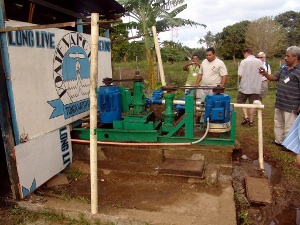 For the first time in the Pacific a coordinated safe drinking water initiative has been introduced that could result in reducing typhoid, cholera, and related water borne diseases.
For the first time in the Pacific a coordinated safe drinking water initiative has been introduced that could result in reducing typhoid, cholera, and related water borne diseases.
Eight countries are participating in developing and implementing Drinking Water Safety Plans (DWSP), introduced by the World Health Organization (WHO) as a “clear, simple risk assessment and risk management process that addresses the many challenges faced in providing safe drinking water,” said Mr. Tasleem Hasan, Water Services Coordinator, SOPAC.
AusAID provided initial funding to introduce DWSP in the Pacific. Those participating are Cook Islands, Marshall Islands, Palau, Vanuatu, Fiji, Niue, Tonga, and Samoa.
Working closely with governments, SOPAC in partnership with WHO, is implementing the DWSP process in pilot water supply sites chosen in each of the countries.
As an example, Water Authority of Fiji’s Kamal Singh, Team Leader Water Treatment, said Drinking Water Safety Plans are now in place in Fiji for four water treatment plants in key population centres.
Mr. Singh said that following an assessment of the state of the water treatment plants, the storage facilities and catchment areas, it was determined that among other risks “much of the infrastructure was aged and required replacement or upgrading, which is now taking place at varying stages of completion.”
He said that drinking water safety plans were developed to ensure safe drinking water for consumers and believes that the process “significantly contributes towards this end in Fiji.”
Each of the countries participating has their challenges in providing safe drinking water. But they are encouraged to follow the same process defined by DWSP, that focuses on is risk assessment and risk management.“Basically DWSP suggests that drinking water supplies be assessed to ensure that the water supplied is safe to drink, and if it is not, why not? Part of the assessment process is to determine what is causing the water to be unsafe.
“From catchment, to water treatment, to delivery to the tap, to use in households by consumers is all analyzed to determine what hazards are causing the contamination.
“Once the causes are discovered, solutions are decided, an Improvement Schedule is put in place that becomes a “living” blueprint for activity to remove the hazards,” said Mr. Hasan.
As part of the DWSP process, an ongoing monitoring schedule is also introduced to ensure that checks and tests are introduced to verify that the hazards identified are under control and “not negatively affect the quality of the water.”
Mr. Hasan said that an important element in Drinking Water Safety Planning (DWSP) was education and training and an understanding that keeping drinking water safe is everyone’s responsibility.
“The public needs to be aware that proper hygiene and sanitation, and an understanding of what contaminates water, are an essential part of keeping drinking water safe."
“Additionally, capacity building, the training of personnel is an essential part of the initiative to sustain DWSP as a permanent process.”





